In the November issue of SCMR, we took a look at several sides of the sustainability issue, including an article about how Unilever took its industrial facilities to zero waste to the landfill on a global basis and we posed the provocative question as to whether sustainability has become a luxury that fewer companies are willing to invest in.
With climate talks underway in Paris, we thought the time was right to ask SCMR readers what they have to say about sustainability. To find out, Judd Aschenbrand, director of research for Peerless Research Group, posed a few questions to our readers and invited your comments. Here's what you had to say.
Question 1: How important are sustainability objectives to your organization?
“Sustainability goals and progress against these goals are critical to our brand image and our customer requirements.”
“Little emphasis has been placed on sustainability here… the emphasis is more on cost, quality and delivery commitments.”
At first glance, sustainability is still high on the priority list of a majority of respondents, with 70% saying that they are very (40.6%) or extremely (29.4%) important to their organizations. Only 5.7% said that sustainability is not very (3.8%) or not at all important (1.9%).
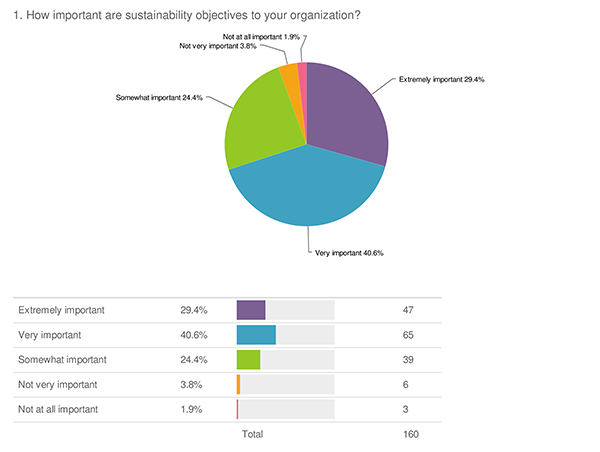
That said, sustainability was more important to larger companies than smaller companies, which may reflect the time, people, and money large companies have to address the issue. Seventy-three percent (73%) of companies with revenues of $1 billion or more said sustainability was extremely or very important to their organization compared to 63% of companies with revenues of less than $100 million.
Question 2: How would you describe your organization's focus on sustainability over the last 2 years?
“There is a closer scrutiny of the products we provide, and in some cases, customers have changed manufacturers if the difference is measurable.”
“We have attempted to take on some sustainability issues, but they take a back seat to production.”
Nearly two-thirds of respondents(64.2%) said that sustainability is something they are focusing on more than in the past while nearly 33% said there has been no change in their organization's outlook. Only 3.1% said that sustainability is less important than in the past.
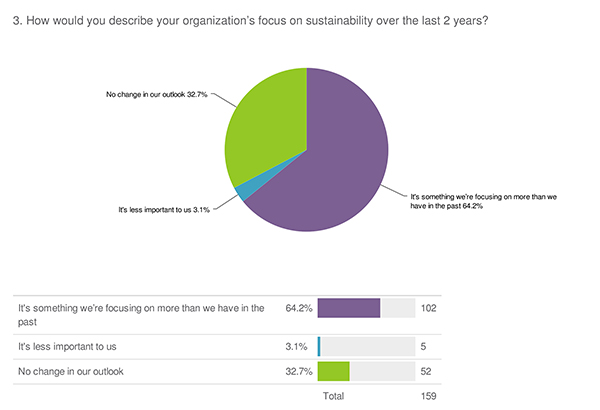
Question 3: What drives efforts to employ/follow sustainability practices within your company?
“Our clients and investors have asked us for our sustainability statement and report.”
“Our Annual Corporate Sustainability Report was GRI Certified for 2014 and 2015. This was a huge accomplishment and a rarity for a company with just 200 employees.”
Given the relative importance our readers place on sustainability, we asked what's driving the effort. While corporate directives (44%), pressure from customers (32%) and an organization's public image (48%) are important, nearly 71% of respondents say that potential cost savings is a key driver of sustainability practices.
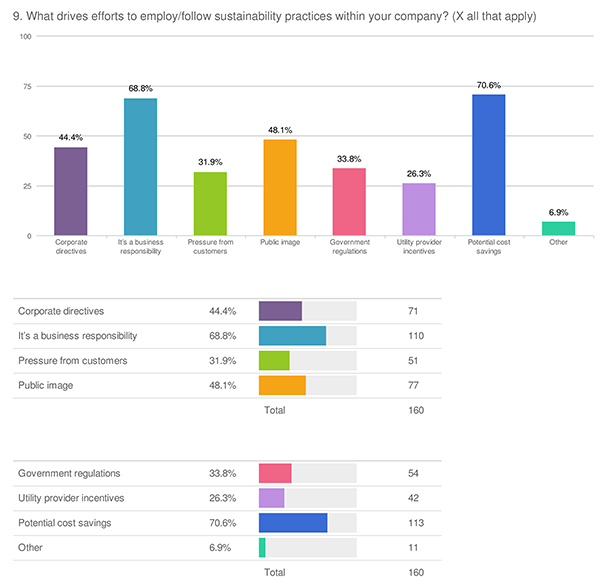
Question 4: What environmental efforts/solutions has your organization implemented?
“We have really focused on lighting as I operate a large warehouse. We run a lot of lights and needed more efficient lighting that used less energy but performed as well or better than our existing lighting system.”
“Nothing much. Mostly, we have done small inconsequential stuff so we can talk about it.”
Recycling and energy conservation practices are the focus of most of the sustainability solutions that organizations have already put into place. For example, 74.5% of respondents are recycling; 65.8% have installed energy efficient lighting and fans; 45.3% have looked at their packaging and/or packing materials; and 37.3% have gone to reusable shipping containers, keeping waste out of the landfill.
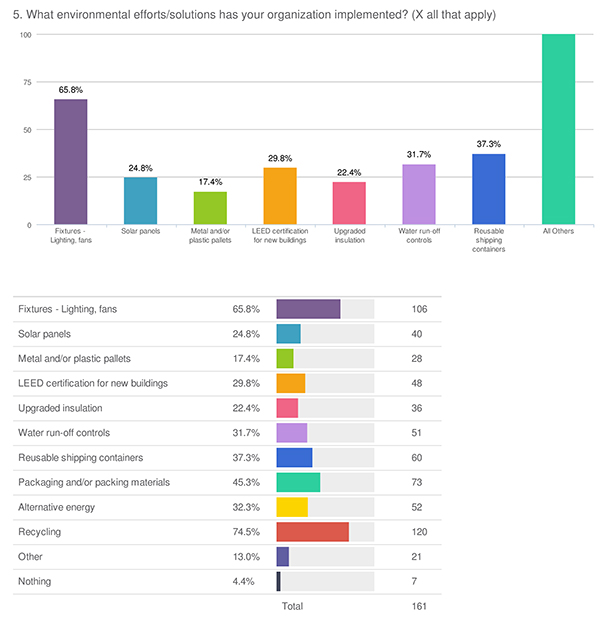
Question 5: And, in which will you be investing during the next 24 months.
“People – we have added staff to this objective.”
“We have ordered new tractors and trailers, with many sustainable upgrades.”
As with the previous question, future sustainability efforts are likely to focus on recycling (47%); lighting and fans (46%) and alternative energy (30%); and packaging (38%) and reusable shipping containers (22%).
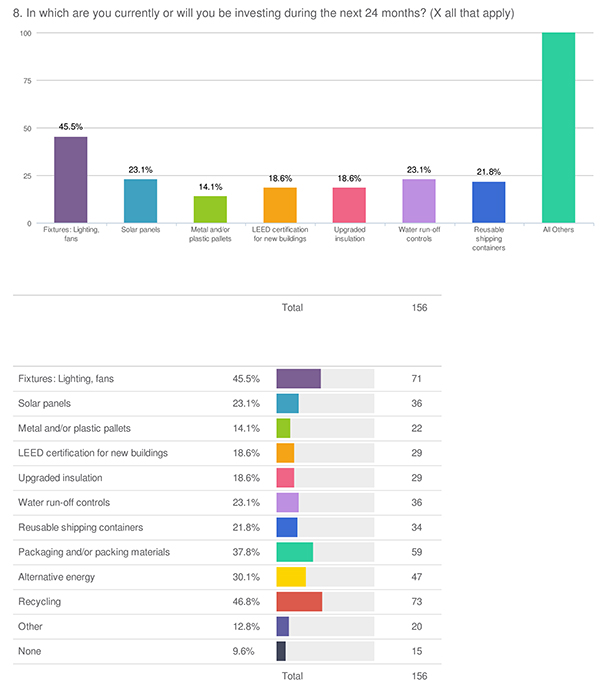
Question 6: How likely are you to increase your sustainability efforts over the next 12 months?
“We have become more focused and intentional about defining what ‘sustainability' means and how we can monitor, influence, and execute to have a positive impact.”
“There have been no changes and no efforts at all within our organization other than a paper recycling initiative that started about 5 years ago.”
Nearly 56% of respondents say they are very or extremely likely to increase their sustainability efforts over the next 12 months. Another 15%, on the other hand said they are not very or not at all likely to increase their sustainability efforts.
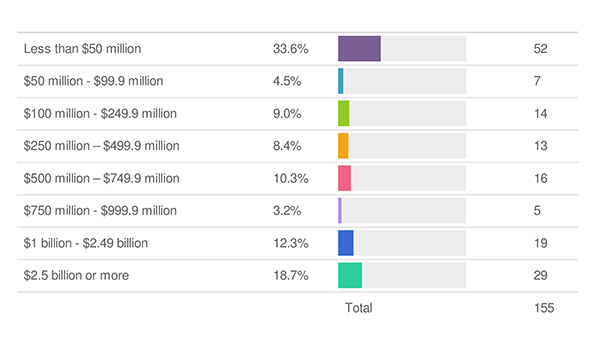
Question 7: What would you say is the single biggest obstacle that's preventing your company from attaining greater sustainability?
“There is very little expertise in this area across our company.”
“We have other issues here that are far more important.”
Yes, sustainability is important, but that doesn't mean moving projects forward is easy, even if it's the right thing to do. So, what are the most significant barriers to sustainability?
According to SCMR's readers, projects must still show a payback (36%). Other important obstacles include a lack of resources (13%), getting user acceptance and buy-in (12.5%) and the lack of a budget (12%).
Clearly, there's still plenty of work to do.
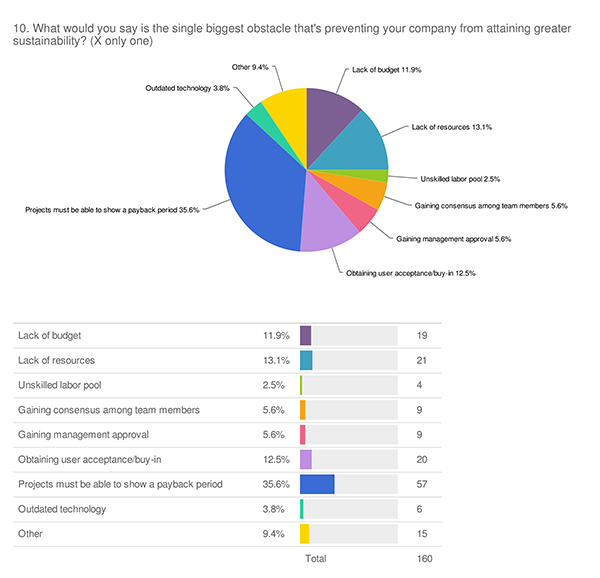
Thank you to everyone who participated in this survey. And, we'd love to hear about your organization's experiences with sustainability. Feel free to send me an email at [email protected].
SC
MR

Latest Supply Chain News
- How CPG brands can deliver on supplier diversity promises
- How S&OP provides the answer to in-demand products
- AI, virtual reality is bringing experiential learning into the modern age
- Humanoid robots’ place in an intralogistics smart robot strategy
- Tips for CIOs to overcome technology talent acquisition troubles
- More News
Latest Podcast

 Explore
Explore
Topics
Latest Supply Chain News
- How CPG brands can deliver on supplier diversity promises
- How S&OP provides the answer to in-demand products
- AI, virtual reality is bringing experiential learning into the modern age
- Humanoid robots’ place in an intralogistics smart robot strategy
- Tips for CIOs to overcome technology talent acquisition troubles
- There is still work to do to achieve supply chain stability
- More latest news
Latest Resources

Subscribe

Supply Chain Management Review delivers the best industry content.

Editors’ Picks




